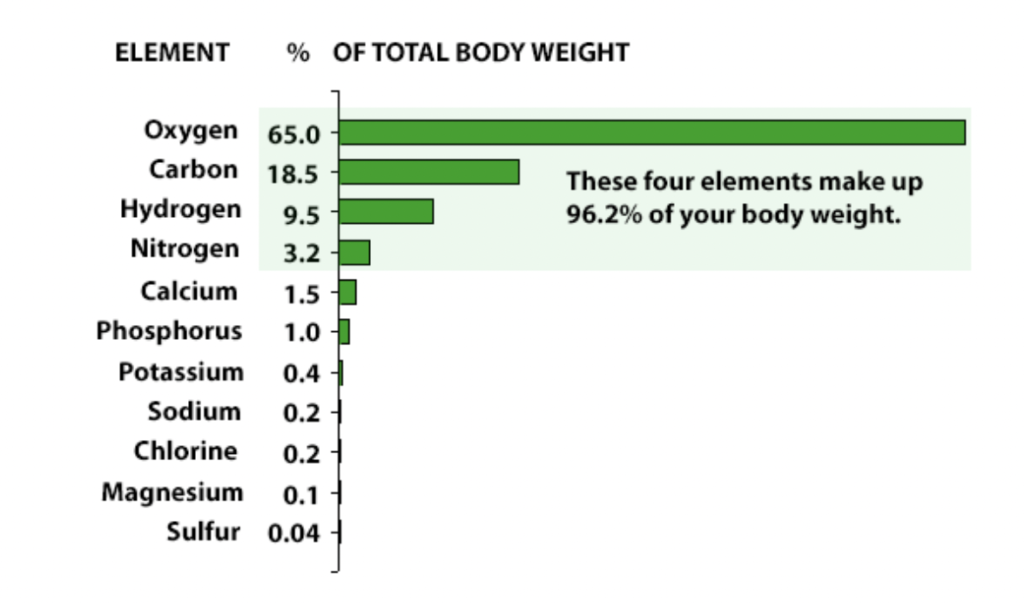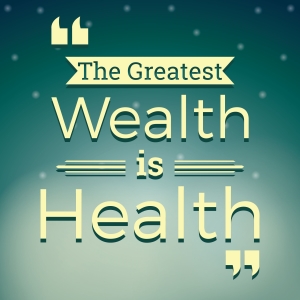
How many elements make up the human body? The answer is 60 of them. For me, magnesium is one of the eleven most important elements. It means that mineral plays an essential role in body activities.


Think about what does happen when you lose something?
It can be many reasons and ways to lose something. You can lose your car keys. It means that you cannot drive. You can lose your umbrella. It means you cannot stay dry while pouring rain down your head.
Let’s go to the unconscious subjects such as a car. If the car lost one of her many details, it would not take you from point A to point B.
A more straightforward example about losing something. If you lost your car keys, can you drive?
Think about it.
If your body loses magnesium, for example, can it perform well?
Medical equipment does not work if it lacks one of a few parts.
Is it clear?
Nothing and nobody can fully operate when it lacks the required details
What does it mean? It means that if a human body lacks elements shown in the chart above, it does not function fully at the beginning of loss.
Later, you will see that you do not feel the same as usual.
For example, if you lack magnesium, you will be among 70-80% of Americans who feel stress, anxiety, cannot sleep properly, and are depressed.
Who needs that?
Knowing that magnesium is one of the most critical minerals in the human body, it is easy to stay well, especially in these turbulent times when you take it.
If you do not know how magnesium is essential in your life, let’s pour all of its benefits here:
- Magnesium gives you energy. The mineral is a cofactor in the production of ATP. Mitochondria manufacture ATP with the help of magnesium. The mineral participates in six steps of the Krebs cycle. Every cell has 1000-1200 mitochondria inside.
- Human proteins require magnesium for production. There are over 3751 magnesium receptor sites in human proteins.
- Magnesium works as a membrane stabilizing agent. It helps balance muscle cell membranes’ excessive contraction and soothes excited nerves.
- The structural integrity of nucleic acids depends on magnesium.
- Phospholipase needs magnesium which is a cofactor in the process of splitting phospholipids. These enzymes participate in creating signal transduction pathways. “The most important one allows calcium to enter cells“(The Magnesium Miracle, 74)
- The enzyme adenylate cyclase requires magnesium. The regulation of adrenaline and glucagon depends on this enzyme. Besides, magnesium binds and regulates the function of gateways to the cell or ion channels.
- Magnesium participates in over 800 hundred enzyme systems
- The enzyme guanosine triphosphatase requires magnesium as a co-factor. Our taste, smell, and light perception do not occur without GTPase. Additionally, proteins dislocate through cell membranes, biosynthesize, and cells differentiate with the help of magnesium as a co-factor for GTPase.
- Ion channel regulation does not occur properly without magnesium.
- Magnesium works as the modulator of oxidative phosphorylation. It doesn’t sound elementary, but in short, magnesium helps form protein complexes in mitochondria.
- Magnesium protects cells from death, regulating calcium access.
- Magnesium helps muscles relax.
It is not easy to comprehend all medical terms. However, knowing that magnesium influences the activities of over 800 enzymes, it sounds like this mineral is vitally essential for humans to survive and flourish.
Think about it. If you feel depressed, your nerves are on edge, or your muscles are sore, the magnesium can pull you out of this misery.

Comparing magnesium with missing detail from the car is a vague effort to describe the importance of this mineral.
Although, think about a car that cannot move without a carburetor. It is a simple example that shows the dependence of the needed detail.
A car is a simple and primitive example when you compare it with the human body, where all systems depend on elements to function correctly. There are thousands of bonds interfering with each other in the human body.
If we miss minerals that come with food or supplements, we risk the body being out of balance and, later on, getting problems such as diseases.
Who needs that again?
I guess that nobody wants to be sick or feel miserable. We have plenty on our plates to deal with now.
By taking magnesium, people can avoid being depressed, panicked, or dealing with heart conditions.
What is about the heart?
The heart contains most of the body’s magnesium. If magnesium is absent, problems associated with the heart occur. Interestingly, the amount of magnesium in the blood must be the same. If the body lacks magnesium is taken from places where magnesium resides. The heart is one of these places, the brain too.
It is the reason why it is so important to take magnesium supplements.
The best magnesium at these times is ReMag. You can read about this miraculous supplement here.
Show stars recognize the importance of magnesium
Stew Peters, the host of The Stew Peters Show e, emphasizes the importance of magnesium, pointing to the fact that most Americans are magnesium deficient.
Stew Peters promotes another supplement. However, it is nothing wrong with it because it is known that it is better to take any magnesium than without this miraculous element.

So, do you take magnesium supplements?
An Update
A Tennesse Senator Frank Niceley wrote a fascinating article. It does show how nutrients and minerals are important to our bodies. Described difference between GMO crops and crops produced on the farm must open the eyes fro everybody who wants him and their family to stay healthy:
I have never seen land grant universities compare the nutrition of different types of corn. Some of the old open-pollinated varieties of corn had 11-12 percent protein. You could fatten a hog on twenty-five bushels of some open-pollinated varieties. When I was in college, we used hybrid corn and figured it was about 9 percent protein. Now, this GMO corn is down to 5.5-6 percent protein, and all they want to do with it is to make ethanol. If we could do one thing, we should quit subsidizing the ethanol industry and put a lot of the land currently given over to GMO corn (and soybeans) back into the pasture.
A dirty little secret about GMO corn is that it has no minerals and no nutrition. Monsanto won’t let you do a side-by-side comparison of GMO and non-GMO corn. When you are feeding your animals and children GMO corn, it looks like corn, it feels like corn, and it might even smell like corn, but there are no minerals in it. I heard on the radio that the USDA said our corn had lost 70 percent of its calcium in the last thirty years. Our fruits and vegetables also have half the minerals they had thirty years ago. I heard that said by the USDA once but have not heard it again. I guess the USDA had to throw it out there just once, so if they ever got sued, they could say, “No, we told everyone about it.”

